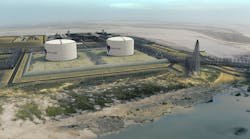Texas LNG latest project to see FERC approval scrapped by federal appeals court
Texas LNG, a 4-million tonne/year (tpy) LNG plant being developed at the Port of Brownsville, Tex., is the latest project approved by the US Federal Energy Regulatory Commission (FERC) to see its certificate scrapped by a federal appeals court.
The US District Court of Appeals for the DC Circuit Aug. 6 vacated FERC’s certificate for the project owned by Texas LNG Brownsville LLC, a subsidiary of Glenfarne Energy Transition LLC. The decision came the same day that the court scuttled the federal regulatory permit for NextDecade Corp.’s 27-million tpy Rio Grande LNG plant also under construction in Brownsville, Tex. (OGJ Online, Aug. 6, 2024).
In both cases, the court ruled that FERC failed to meet its obligations under the National Environmental Policy Act (NEPA) when it reissued the Texas LNG and Rio Grande LNG certificates without undertaking a supplemental environmental review to address environmental justice and air quality issues identified by the court’s prior remand. “Given the nature and severity of the flaws in the Commission’s second effort to properly assess the projects, we vacate the reauthorization orders and remand to the Commission for further consideration,” Judge Brad Garcia wrote for the three-judge panel.
Since its 2019 project authorization by FERC, Texas LNG has been in a protracted legal battle over the order. Texas LNG’s FERC authorization was appealed to the DC Circuit and then remanded back to FERC, a process that took 1.5 years.
This most recent decision will likely delay Texas LNG’s final investment decision, which it planned to make later this year, ClearView Energy Partners said in a note Aug. 6, explaining that the project’s certificates could be invalid in 6 weeks if parties do not ask the panel or the full court to reconsider, and construction cannot occur without them. The length of any delays depends on how long it takes FERC to develop a supplemental EIS—a process that typically takes at least 6 months—and how any further appeals play out, the research firm said.
A Texas LNG spokesman said the company had “full confidence” that FERC would address the matter “judiciously and efficiently.” Texas LNG is “designed to be the greenest on the planet once operational,” the spokesman said in a statement, adding that the company is “committed to resolving this issue quickly and completely to continue our progress toward FID and construction in the near term.”
This marks the third FERC project certificate scuttled by the court in the past 3 weeks. In addition to Texas LNG and Rio Grande LNG, the same court vacated FERC’s approval of Transcontinental Gas Pipeline Co.’s nearly $1 billion Regional Energy Access expansion project July 30, saying FERC failed to adequately review the natural gas pipeline’s potential greenhouse gas (GHG) emissions (OGJ Online, Jul. 30, 2024).
The same court also sent back FERC’s approval of Commonwealth LNG LLC’s proposed 9.5 million tpy plant in Cameron Parish, La., on July 17, ordering the commission to reevaluate its approval to include climate impacts. Unlike the other projects, which were vacated by the court, the Commonwealth LNG decision was remanded (OGJ Online, July 17, 2024).
Both the Texas LNG and Rio Grande LNG cases were brought by the city of Port Elizabeth, Tex., and environmental groups, including the Sierra Club. Sierra Club senior attorney Nathan Matthews noted it was “the third time in a month that the D.C. Circuit has held that FERC failed to exercise oversight over gas infrastructure, suggesting that the days of FERC acting as a rubber stamp could soon be over.”
ClearView noted, however, that the DC Circuit agreed with FERC’s rationale for why it did not rely on the social cost of carbon (SCC) to determine project-level significance of GHGs in the joint Texas LNG and Rio Grande LNG decisions. “This may bode well for pipelines in other pending cases as it follows the language in the Driftwood compromise. The next case relying on that rationale comes up for oral argument on September 10,” ClearView added.
About the Author
Cathy Landry
Washington Correspondent
Cathy Landry has worked over 20 years as a journalist, including 17 years as an energy reporter with Platts News Service (now S&P Global) in Washington and London.
She has served as a wire-service reporter, general news and sports reporter for local newspapers and a feature writer for association and company publications.
Cathy has deep public policy experience, having worked 15 years in Washington energy circles.
She earned a master’s degree in government from The Johns Hopkins University and studied newspaper journalism and psychology at Syracuse University.
